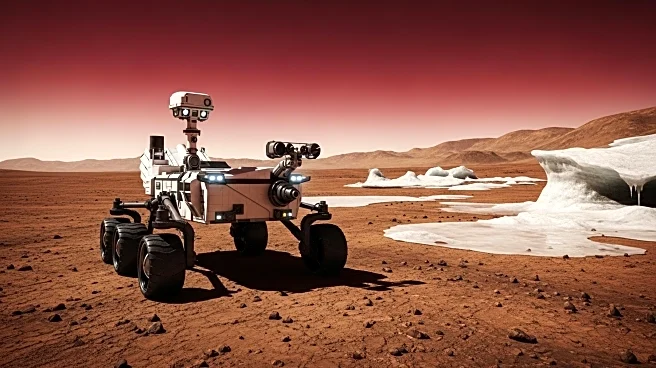What's Happening?
A recent study has revealed that Mars has experienced multiple ice ages, leading to a significant reduction in its ice deposits over millions of years. Researchers from Okayama University and other Japanese institutions analyzed high-resolution images
from NASA's Mars Reconnaissance Orbiter, focusing on craters that showed signs of previous glaciers. The study found that Mars underwent ice ages between approximately 640 million and 98 million years ago, with each cycle resulting in less remaining ice. This gradual desiccation is attributed to shifts in Mars's axial tilt, affecting sunlight distribution and ice formation. The findings are crucial for future Mars missions, as they identify potential long-lived ice deposits that could serve as resources for astronauts, providing water, oxygen, and rocket fuel.
Why It's Important?
The study's findings are significant for future Mars exploration, as they highlight areas where ice deposits could be utilized by astronauts. Access to these resources would reduce the need to transport supplies from Earth, making missions more sustainable and cost-effective. The identification of resource-rich regions also aids in planning safe landing sites for robotic and crewed missions. Understanding Mars's historical climate changes provides insights into its geological history and helps address questions about its past water presence and current dryness. This research represents a step towards utilizing Martian resources for human survival and exploration.
What's Next?
Future missions to Mars may focus on exploring these identified ice-rich regions to assess their viability for resource extraction. Robotic missions could be deployed to further study the ice deposits and test technologies for resource utilization. As the study provides a foundation for understanding Mars's climate history, ongoing research may continue to refine models of Martian climate dynamics and ice distribution. Collaboration between international space agencies could enhance the development of technologies needed for resource extraction and utilization on Mars.
Beyond the Headlines
The study raises ethical and environmental considerations regarding the extraction and use of Martian resources. As space exploration advances, discussions on planetary protection and sustainable practices become increasingly important. The potential for human settlement on Mars also prompts cultural and societal reflections on humanity's role in space exploration and the preservation of extraterrestrial environments.















